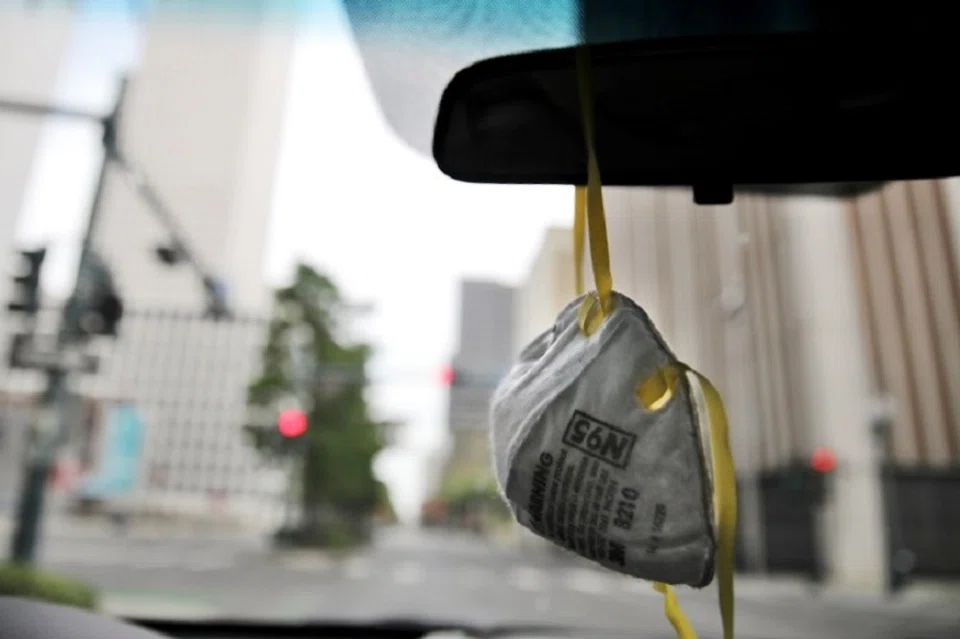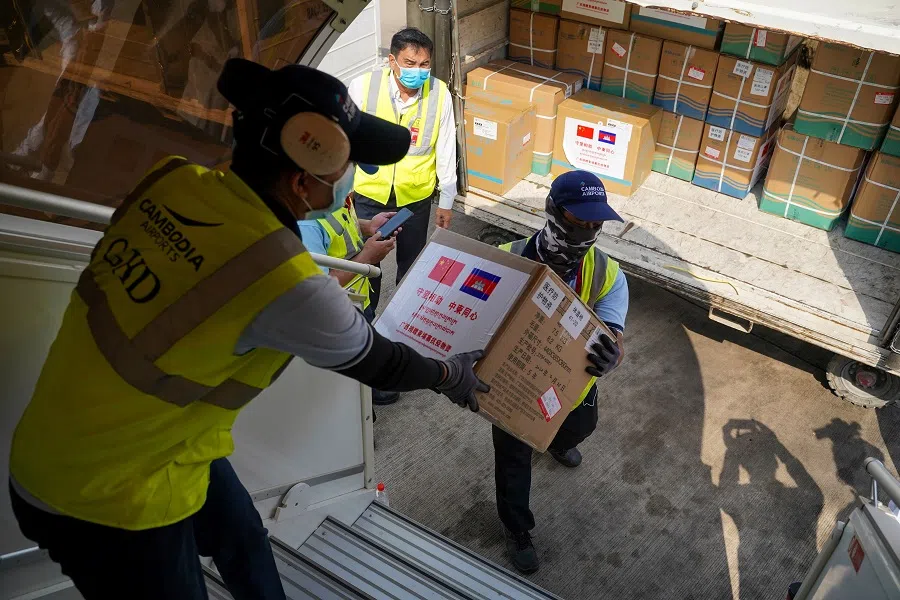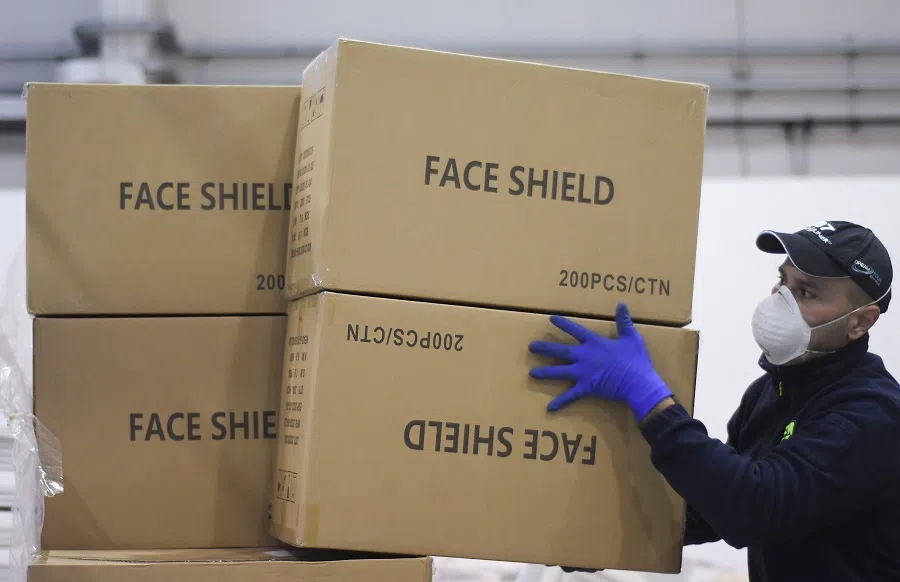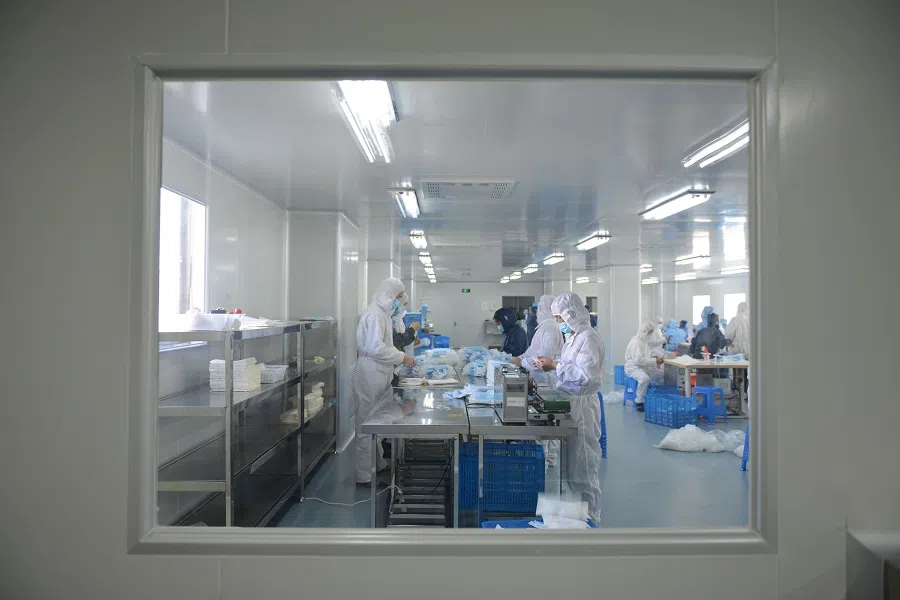Mask: A national tool for diplomatic games
A mask is not just a mask in times of a global health pandemic. Neither is humanitarian assistance simply that either. Zhu Ying traces the effect that mask politics is having on China's efforts at redeeming its image abroad and on larger issues such as globalisation.

A pristine, white mask bears an increasingly political hue amid the Covid-19 pandemic. It has become a diplomatic tool to tell the story of the games nations play. History will remember the mask being used as a strategic tool long after the pandemic subsides.
Firstly, the allocation of masks has suddenly become political. Wuhan's lockdown on 23 January announced to the world the seriousness of the outbreak in China. The very next day, Taiwan announced a ban on masks exports for a month to ensure that it would have an adequate supply of masks. Taiwan's swift action invited harsh criticism from former Taiwan President Ma Ying-jeou, who said that the government was "inhumane".
He (Hun Sen) announced that there would be no wearing of masks, no suspension of direct flights to China, no evacuation of Cambodians in China, and no discrimination against the Chinese.
But is the Tsai Ing-wen government really inhumane? On 22 January, Taiwan donated 6000 masks to Australia. On 1 April, Tsai announced that Taiwan will be donating ten million masks to countries hit hardest by the coronavirus, namely, by giving two million masks to the US, seven million masks to Europe, and one million masks to countries with diplomatic relations with Taiwan. Taiwan's actions earned praise from Ursula von der Leyen, President of the European Commission, who thanked Taiwan for its efforts and tweeted that "acts like this show that we are #StrongerTogether".
Clearly, the Tsai government's earlier knee-jerk reaction indicates that its animosity towards the Chinese government outweighs humanitarian considerations. Similarly, out of political considerations, the World Health Organisation (WHO) would not have allowed Taiwan free access to its technical meetings no matter how severe the outbreak. Politics trumped health concerns across the Taiwan Strait, and continues to be an overriding factor in all areas.
Secondly, the wearing of masks has become a political issue. Cambodian Prime Minister Hun Sen displayed loyalty to China following the outbreak of the coronavirus in Wuhan. On 30 January, Hun Sen warned reporters and officials that anyone seen wearing a mask would be asked to leave. He announced that there would be no wearing of masks, no suspension of direct flights to China, no evacuation of Cambodians in China, and no discrimination against the Chinese.
In early February, Hun Sen asked to visit Wuhan. The Chinese demurred but agreed to host him in Beijing instead. Hun Sen's willingness to pay the country a visit at such a difficult time greatly moved China, prompting the China Asia Economic Development Association to donate 100,000 masks to Cambodia on 22 March, and China's HOdo Group to donate one million masks to Cambodia on 28 March. At this time, China-Cambodia relations can be said to be buoyed up by masks.

Third, masks have become a "red" diplomacy tool. After China has largely contained the coronavirus, it began providing medical resources - including masks - to many countries. As of 20 March, China has lent support to 82 countries, the WHO, and the African Union in a show of China's power, responsibility, and spirit.
...a commentary in France's Le Monde said pointedly, "Strangely, however, China's state media has never reported that it had received such assistance before."
China's mask diplomacy can help repair its damaged reputation as a result of the coronavirus, as alluded to in an article published on the Chinese site of the BBC titled "How China's 'Mask Diplomacy' is Rebuilding the Fallen Image of a Big Power" (《中国'口罩外交'如何重塑'倒下的大国形象》) on 28 March. The article did not echo the Chinese state media's bold claims that "With Reason, the World Should Thank China" (《理直气壮,世界应该感谢中国》). Instead, the article began by pointing out that the Japanese government and people have donated masks and other supplies to China since the beginning of China's outbreak. On 28 January, the overseas edition of People's Daily also reported that Korea had donated two million masks and other medical supplies to China.
China's claim that the world should thank China has been counterproductive and even drew backlash from the Chinese public. The European approach has been to emphasise the reciprocity at play when expressing their gratitude to China. In February when the coronavirus escalated and worsened in China, France and the EU donated a substantial amount of medical supplies to China. In end March, von der Leyen also said that the EU had responded to China's request when China needed the most help and had donated 56 tonnes of medical equipment to China. Following this, a commentary in France's Le Monde said pointedly, "Strangely, however, China's state media has never reported that it had received such assistance before."
On 27 March, the Chinese site of the Radio France Internationale published an article titled "China's Mask Diplomacy Drew Ire from Europe" (《中国口罩外交惹欧洲反感》). It said: "It was initially a good thing that China donated masks to Italy when the latter declared a state of emergency. However, Chinese state media gave it exaggerated publicity, while 'we-media' content producers engaged in over-the-top boasting of their good deeds. These actions have put Western public opinion on the offensive."

Regrettably, China's mask diplomacy has not achieved expected results as the masks that China exported were below standards. On 28 March, the Dutch Ministry of Health announced that it had received 1.3 million China-made masks. However, the masks failed two inspection tests and were found to have defective filter membranes and were unable to protect the face properly. They were eventually recalled altogether.
...many masks on the market currently only have a filtration efficiency between 20% and 30%, with some even as low as 10%.
In March, a video went viral on the Chinese internet. In the video, a mask production worker was seen using numerous masks to wipe his shoes and was heard saying, "I haven't used it to wipe my behind yet!" This video spread overseas, and even US Attorney General William Barr reposted it.
On 2 April, a report on China's Tencent website titled "The Second Half of the Mask Gamble" (《口罩赌局下半场》) said that many masks on the market currently only have a filtration efficiency between 20% and 30%, with some even as low as 10%. The main reason for this is that upstream raw materials manufacturers cut corners - many of the mask factories simply do not have sterile facilities - which calls the quality of masks produced into question.
This is the reason why China imported two billion masks within five weeks since January, concentrating the world's supply of masks in China.
Fourth, the fact that masks have become strategic resources is a sign that globalisation is beating a retreat. The coronavirus first broke out in China and it was natural for China to treat masks as strategic resources in its battle against the coronavirus. This is the reason why China imported two billion masks within five weeks since January, concentrating the world's supply of masks in China.
China's status as the world's factory quickly made it the global leader in mask manufacturing. Prior to the outbreak of the coronavirus in Wuhan, China had already been manufacturing half of the world's surgical masks. Following the coronavirus outbreak, China propelled and expanded mask production lines across the country, even in factories that did not originally produce masks. As of 29 February, China was already producing 116 million masks on a daily basis, 12 times the number reported on 1 February. Morgan Stanley estimated that China currently has control over 85% of the global mask production capacity.
The vulnerability of the medical supply chain as exposed by the pandemic will remain a painful memory for the US.

Such high capacity for producing masks stands in strong contrast to the situation in the US. A New York Times article titled "How the World's Richest Country Ran Out of a 75-Cent Face Mask" published on 25 March asked: "Why is the US running out of face masks for medical workers? How does the world's wealthiest country find itself in such a tragic and avoidable mess?" On 3 April, 3M said that it has gained approval from the Chinese government to export ten million N95 respirators produced in its factories in China to the US.
From these events, we can gather that the US will review the supply chain that had been set up to reduce production costs. The vulnerability of the medical supply chain as exposed by the pandemic will remain a painful memory for the US. In an opinion piece for Fox News, Washington-based national security analyst Rebecca Grant called for a "total reconsideration of China's role in the world and specifically, the US economic relationship with China". She added that "bringing drug manufacturing back home to the USA is a top priority" and "it is increasingly clear that coronavirus ended globalisation as we know it".
The project to look beyond political regimes and embark on the pacifist path of globalisation following the fall of the Berlin Wall has evidently failed. Globalisation as we know it clearly demonstrates opposing ideologies and is doomed to beat a retreat. The global supply chain of masks will crumble and major countries will pay attention to the strategic significance of mask production. Just like French President Emmanuel Macron, it is also the wish of many other countries to be self-sufficient in protective masks production.
Related: Is China's pandemic diplomacy working? | China raises its international game with 'pandemic diplomacy' in Europe | Amid pandemic chaos, will China seize the chance to shape the global narrative? | China will have too many mask-making factories | Globalisation as we know it shall come to an end | Hun Sen's China visit: Love in the time of coronavirus





